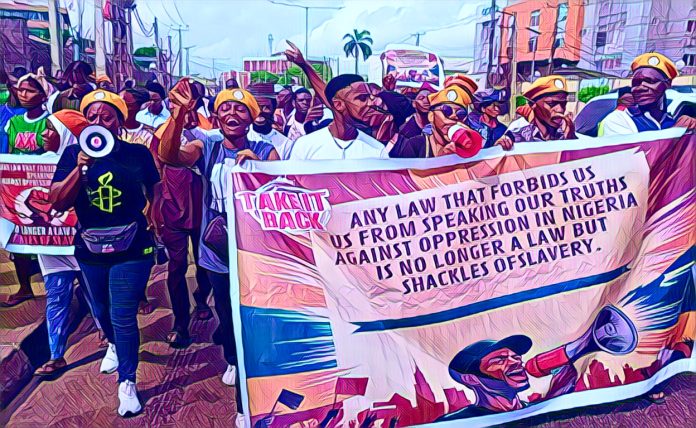KEY POINTS
- Nationwide protests erupted as the Take It Back Movement demonstrated against the Cybercrime Act, Rivers State’s political crisis, and economic hardship.
- Police presence was heavy in Lagos, where activists defied warnings, while Sowore vowed the protests would continue despite opposition.
- Critics accuse the government of using the Cybercrime Act to stifle dissent, with tensions rising over civil liberties and governance.
Members of the Take It Back Movement took to the streets across Nigeria on Monday, staging coordinated protests in Abuja, Lagos, Oyo, and Rivers States.
The demonstrators, clad in their signature orange berets, voiced opposition to several pressing national issues, including the controversial application of the Cybercrime Act, the political crisis in Rivers State, and the worsening economic conditions.
In Lagos, protesters gathered at the bustling Ikeja Under Bridge area, chanting solidarity songs and waving placards under the watchful eyes of armed police officers. “We cannot remain silent while our rights are being trampled upon,” one protester declared.
The Nigeria Police Force had earlier urged organizers to cancel the demonstrations, labeling them as “ill-timed” and “ill-conceived.” However, former presidential candidate and movement leader Omoyele Sowore remained defiant. “No amount of intimidation will stop us from demanding accountability,” he insisted.
Tensions rise as security forces deploy tear gas canisters
Channelstv reports that the protests unfolded amid heightened security measures, with officers from the Nigeria Security and Civil Defence Corps (NSCDC), Lagos State Traffic Management Agency (LASTMA), and Lagos State Neighbourhood Safety Agency present at the scene. Photographs from the event showed police armed with tear gas canisters, though no violent clashes were immediately reported.
Similar demonstrations in Abuja and Port Harcourt drew smaller but equally determined crowds, with activists calling for an end to what they describe as government overreach.
The Cybercrime Act, particularly its Section 24, has faced criticism for allegedly being used to suppress free speech, with several journalists and activists arrested under its provisions.
Meanwhile, Rivers State remains embroiled in a political standoff following the declaration of a state of emergency last month. Economic grievances, including rising inflation and unemployment, further fueled the protesters’ demands.
As the day progressed, social media buzzed with images and videos from the protests, sparking debates about the right to peaceful assembly in Nigeria. Authorities have yet to issue an official statement beyond the initial police warning.



